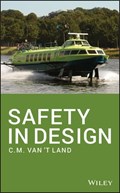Expert insight and guidance on integrating safety into design to significantly reduce risks to people, systems, property, and communities
Safe design refers to the integration of hazard identification and risk assessment methods early in the design process so as to eliminate or minimize the risks of catastrophic failure throughout the life of a system, process, product, or service. This book provides engineers, designers, scientists and governmental officials with the knowledge and tools needed to seamlessly incorporate safety into the design of civil, industrial, and agricultural installations, as well as transportation systems, so as to minimize the risk of accidents and injuries.
The methodology described in Safety in Design originates from the continuous safeguarding techniques first developed in the chemical industry and can successfully be applied to a range of industrial and civil settings. While the author focuses mainly on the aspects of safe design, he also addresses procedures which have a proven track record of preventing and alleviating the impacts of accidents with existing designs. He shares lessons learned from his nearly half-century of experience in the field and provides accounts of mishaps which could have been prevented, or significantly mitigated, based on data collected from approximately seventy incidents that have occurred in various countries.
• Describes the application of safe design in an array of fields, including the chemical industry, transportation, farming, the building trade, and leisure
• Reviews the history of intrinsic process safeguarding, which was first used in the chemical industry to minimize the risk of human error or instrumentation failure
• Describes dozens of preventable incidents to illustrate the critical role safe design can play
• Provides expert guidance and valuable tools for seamlessly weaving safety into every phase of the design process
Safety in Design is an indispensable working resource for chemical, civil, mechanical, risk, and safety engineers, as well as professional R&D scientists, and process safety professionals. It is also a useful reference for insurers who deal with catastrophic loss potentials, and for government personnel who regulate or monitor industrial plants and procedures, traffic systems, and more.

